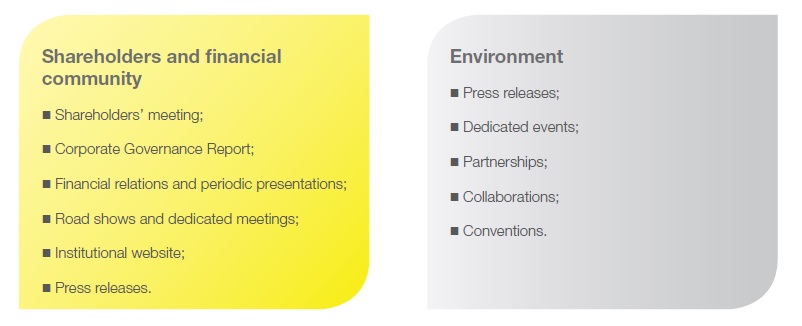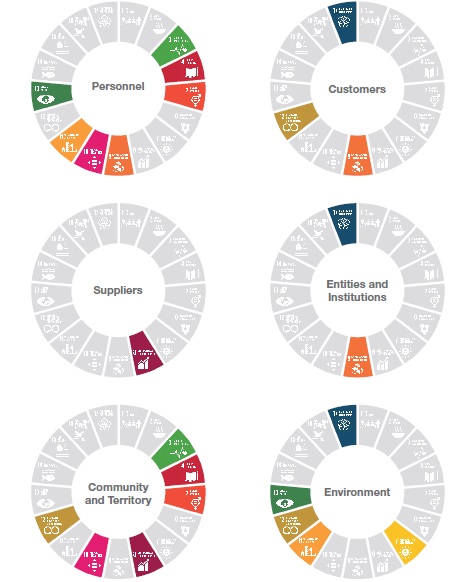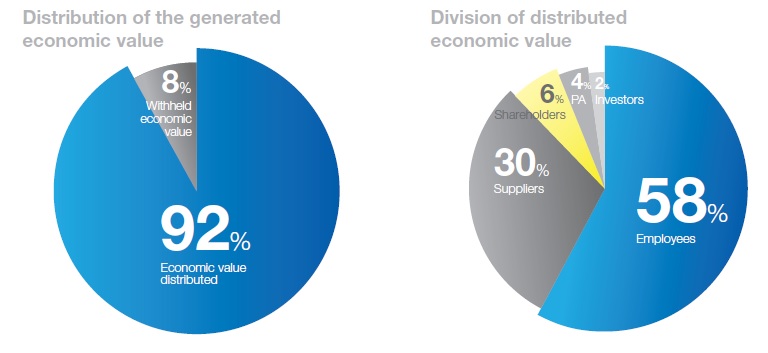In line the Group identity and principles of the Code of Ethics, building and developing relationships of loyalty with the stakeholders takes priority within the process of generating and sharing value for the Company and such stakeholders with view to continuity and conciliation of the related interests. Not only does this contribute to affirming the credibility of Poste Italiane inthe social context within which it operates, but also to consider possible impacts of a non-financial nature that the Company’s activities may have, adopting all measures necessary for preventing and minimising any negative impacts whilst favouring the circulation of the positive impacts.
As its starting point, the Company carefully mapped the categories of stakeholders with which it relates during the performance of its activities, identifying particular stakeholders having an impact in reaching the strategic objectives and those that could be significantly influenced by the latter. Such mapping was performed following dthe International Standard AA1000-Stakeholder Engagement Standard (SES) guidelines developed by Accountability1 to methodologically support stakeholder engagement.
The result of the above mentioned activity has led to the identification of seven macro categories of stakeholders:Shareholders and Financial Community, Community and Territory (category associations, media, academicworld), Customers (Consumers' Associations), Entities and Institutions (authorities, Fondimpresa, banks and creditinstitutes), Suppliers (Business Partner), Personnel (Poste people, Trade Union Organisation) and Environment.The following table shows the macro categories of identified

Handling relations with these categories, listening to requirements and returning the correct feedback with concrete actions, Poste Italiane is also able to give its contribution to the Sustainable Development Goals (SDGs).

The Company is attentive in guaranteeing a structured and continuous dialogue with its stakeholders by means of variousinstruments which can continuously operate (for example, internal communication with employees) or consist in ad hocinitiatives. Amongst these, in particular, the stakeholder engagement imitative in early 2018 represented an importantmoment of discussion to set the basis for a new future Group sustainability strategy.
Indeed, Poste Italiane organised its first Multi-stakeholders’ Forum by creating an opportunityof dialogue and debate about relevant matters of sustainability in the sector with the intention tosharing ideas and useful projects aimed at creating shared value with the main representativesof institutions, associations, partners, collaborators and other key stakeholders with which PosteItaliane interacts when carrying out its activities. On this occasion, the stakeholders assumed therole of promoters of change and development in the Group’s sustainability strategies.
During the meeting, which took place in plenary sessions and group sessions dedicated to specific topics, the stakeholders were called to give their impressions and appraisals on aspects characterised by sustainability relevance for Poste Italiane: the participants were askedto express the level of importance of each aspect from the viewpoint of their own category ofpertinence and to define possible evolutionary scenarios in the Company’s approach respect to some of the specific macro-topics (“Quality of products and services”, “Economic and socialdevelopment of the territory” and “Green Strategy”).So as to extend involvement and obtain an even greater response, the assessment of aspects ofsustainability was completed by asking the 30 stakeholders to express their perception of suchtopics as discussed during the Multi-stakeholders’ Forum by means of an online survey.
From a general point of view, the engagement activities provided by the Forum highlightedan alignment between internal evaluations and the evaluations of the external stakeholdersregarding the topics of interest, thereby confirming the ability of reputational protection (alsocorroborated by the Group’s reputational risk management process) of analysis and interpretationof the trends expressed in the territories and by customers on the part of assigned corporate functions. The event has created the bases for a structured and constant relationship amongthe various stakeholders which could be functional in defining a common vision and a path ofsustainable development which could generate shared value in the long-term.
As its starting point, the Company carefully mapped the categories of stakeholders with which it relates during the performance of its activities, identifying particular stakeholders having an impact in reaching the strategic objectives and those that could be significantly influenced by the latter. Such mapping was performed following dthe International Standard AA1000-Stakeholder Engagement Standard (SES) guidelines developed by Accountability1 to methodologically support stakeholder engagement.
The result of the above mentioned activity has led to the identification of seven macro categories of stakeholders:Shareholders and Financial Community, Community and Territory (category associations, media, academicworld), Customers (Consumers' Associations), Entities and Institutions (authorities, Fondimpresa, banks and creditinstitutes), Suppliers (Business Partner), Personnel (Poste people, Trade Union Organisation) and Environment.The following table shows the macro categories of identified
1 Standard AA1000SES version 2015 was considered when drawing up the Model.
Poste Italiane’s stakeholder engagement

Handling relations with these categories, listening to requirements and returning the correct feedback with concrete actions, Poste Italiane is also able to give its contribution to the Sustainable Development Goals (SDGs).
SDGs impacted by Poste Italiane thanks to stakeholder engagement

The Company is attentive in guaranteeing a structured and continuous dialogue with its stakeholders by means of variousinstruments which can continuously operate (for example, internal communication with employees) or consist in ad hocinitiatives. Amongst these, in particular, the stakeholder engagement imitative in early 2018 represented an importantmoment of discussion to set the basis for a new future Group sustainability strategy.
Indeed, Poste Italiane organised its first Multi-stakeholders’ Forum by creating an opportunityof dialogue and debate about relevant matters of sustainability in the sector with the intention tosharing ideas and useful projects aimed at creating shared value with the main representativesof institutions, associations, partners, collaborators and other key stakeholders with which PosteItaliane interacts when carrying out its activities. On this occasion, the stakeholders assumed therole of promoters of change and development in the Group’s sustainability strategies.
During the meeting, which took place in plenary sessions and group sessions dedicated to specific topics, the stakeholders were called to give their impressions and appraisals on aspects characterised by sustainability relevance for Poste Italiane: the participants were askedto express the level of importance of each aspect from the viewpoint of their own category ofpertinence and to define possible evolutionary scenarios in the Company’s approach respect to some of the specific macro-topics (“Quality of products and services”, “Economic and socialdevelopment of the territory” and “Green Strategy”).So as to extend involvement and obtain an even greater response, the assessment of aspects ofsustainability was completed by asking the 30 stakeholders to express their perception of suchtopics as discussed during the Multi-stakeholders’ Forum by means of an online survey.
From a general point of view, the engagement activities provided by the Forum highlightedan alignment between internal evaluations and the evaluations of the external stakeholdersregarding the topics of interest, thereby confirming the ability of reputational protection (alsocorroborated by the Group’s reputational risk management process) of analysis and interpretationof the trends expressed in the territories and by customers on the part of assigned corporate functions. The event has created the bases for a structured and constant relationship amongthe various stakeholders which could be functional in defining a common vision and a path ofsustainable development which could generate shared value in the long-term.
Thanks to the engagement activities described above, it was possible for Poste Italiane to have a clear idea of the requests of the external subjects respect to its work and the possibilities available for creating social and environmental benefits, exploiting its operational abilities.
Shown below are the main requests arising with regard to the topics subject matter of debate by the stakeholders involved in the engagement activity.
Relations with institutions. Recognising the service offered by Poste Italiane as a fundamental “asset” for the Nation and the local community, the opportunity to coordinate the dialogue between the company and local authorities in a continuous and structured way was pointed out. Indeed, it was reaffirmed that Poste Italiane can be a fundamental partner in territorial policy projects and the economic and social development of the territory. Finding shared solutions together would allow the social needs of the community to be answered, contextually permitting the competitiveness and continuity of the business.
Economic and social impact. The economic and social impact that Poste Italiane can generate in terms of employment, income and accessibility emerged from the analysis as a highly relevant and priority issue for the stakeholders. Indeed, many acknowledge the key role the Company may have in creating positive impacts in the medium/long period, above all thanks to its capillary distribution in the nation. According to the stakeholders, the Company can exploit its advantageous and strategic position in the national territory to valorise and positively influence the communities within which it operates, especially the smaller ones.
Inclusion. The topic of digital inclusion was acknowledged as a key driver for improving the quality of products and services provided, particularly in supporting categories defined as “poorly protected” such as the elderly and teenagers.
Third Sector as a key stakeholder. The Third Sector was recognised as an important stakeholder, given its deep knowledge of the community’s requirements and ability to give valid support to the Company in correctly identifying possible effective initiatives.
Customer tailored services. Also with reference to the need to promote inclusion, stakeholders accentuated the necessity for tailor made products and services for the Customer, with a good level of accessibility and digitalisation. Moreover, the proximity and audience of the Customer during the “post-sales” phase as well were identified by the participant as aspects able to differentiate Poste Italiane from other operators on the market.
Development of intellectual capital. Given the number of resources it employees, Poste Italiane is vested with the social responsibility of safeguarding the training and professional growth of its employees, thus also contributing to the pursuit of more general objectives on the matter of social cohesion. These elements are also deemed as fundamental because clients find reliable, informed and aware stakeholder in Poste Italiane.
“Green” Strategy. The stakeholders remarked on the utility of defining a “Green” strategy. This can represent a decisive lever in creating shared value. The adoption of low impact solutions and technologies, in fact, allows costs to be optimised over time and benefits to be generated for the environment. Possible solutions include meeting energy demand both through purchase of “clean” energy from renewable sources and through large scale installation of plants that self-produce renewable energy. Furthermore, in order to stimulate heightened environmental responsibility along the supply chain, stakeholders have expressed their appreciation regarding the use of environmental criteria in the supplier selection and assessment process.
Shown below are the main requests arising with regard to the topics subject matter of debate by the stakeholders involved in the engagement activity.
Relations with institutions. Recognising the service offered by Poste Italiane as a fundamental “asset” for the Nation and the local community, the opportunity to coordinate the dialogue between the company and local authorities in a continuous and structured way was pointed out. Indeed, it was reaffirmed that Poste Italiane can be a fundamental partner in territorial policy projects and the economic and social development of the territory. Finding shared solutions together would allow the social needs of the community to be answered, contextually permitting the competitiveness and continuity of the business.
Economic and social impact. The economic and social impact that Poste Italiane can generate in terms of employment, income and accessibility emerged from the analysis as a highly relevant and priority issue for the stakeholders. Indeed, many acknowledge the key role the Company may have in creating positive impacts in the medium/long period, above all thanks to its capillary distribution in the nation. According to the stakeholders, the Company can exploit its advantageous and strategic position in the national territory to valorise and positively influence the communities within which it operates, especially the smaller ones.
Inclusion. The topic of digital inclusion was acknowledged as a key driver for improving the quality of products and services provided, particularly in supporting categories defined as “poorly protected” such as the elderly and teenagers.
Third Sector as a key stakeholder. The Third Sector was recognised as an important stakeholder, given its deep knowledge of the community’s requirements and ability to give valid support to the Company in correctly identifying possible effective initiatives.
Customer tailored services. Also with reference to the need to promote inclusion, stakeholders accentuated the necessity for tailor made products and services for the Customer, with a good level of accessibility and digitalisation. Moreover, the proximity and audience of the Customer during the “post-sales” phase as well were identified by the participant as aspects able to differentiate Poste Italiane from other operators on the market.
Development of intellectual capital. Given the number of resources it employees, Poste Italiane is vested with the social responsibility of safeguarding the training and professional growth of its employees, thus also contributing to the pursuit of more general objectives on the matter of social cohesion. These elements are also deemed as fundamental because clients find reliable, informed and aware stakeholder in Poste Italiane.
“Green” Strategy. The stakeholders remarked on the utility of defining a “Green” strategy. This can represent a decisive lever in creating shared value. The adoption of low impact solutions and technologies, in fact, allows costs to be optimised over time and benefits to be generated for the environment. Possible solutions include meeting energy demand both through purchase of “clean” energy from renewable sources and through large scale installation of plants that self-produce renewable energy. Furthermore, in order to stimulate heightened environmental responsibility along the supply chain, stakeholders have expressed their appreciation regarding the use of environmental criteria in the supplier selection and assessment process.
The summary of production and distribution of economic value allows thewealth generated by a company to be quantified, how it is determined andhow it is distributed to the stakeholders. This instrument is able to clearly showthe direct economic impacts that Poste Italiane generates on macro-categoriesof stakeholders, such as employees, suppliers, Public Administration, investorsand shareholders.
Drawing benefit from most of this value were employees (58%) and suppliers (30%).

Drawing benefit from most of this value were employees (58%) and suppliers (30%).



